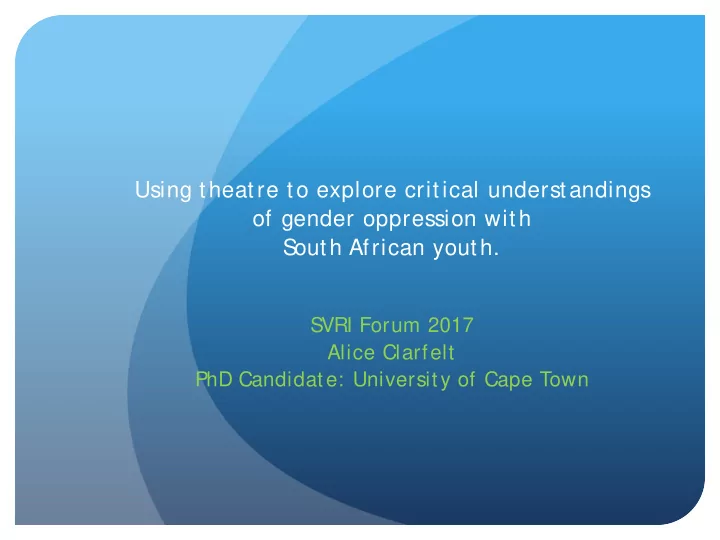

Using theatre to explore critical understandings of gender oppression with S outh African youth. S VRI Forum 2017 Alice Clarfelt PhD Candidat e: Universit y of Cape Town
Guiding concepts. Peer education. Gender and social identities. Participatory action research. Critical consciousness “ conscientizac ̧ a ̃ o” (Friere, 1973). Theatre of the Oppressed (Boal, 1973).
Theatre of the Oppressed. A ‘ rehearsal for revolution’ (Boal, 1979) TOO includes different techniques and special improvisations that turn “ the practice of theatre into an effective tool for the comprehension of social and personal problems and the search for their solutions.” (Boal, 1995).
Methods. 11 peer educators, 18-35, isiXhosa speaking, socially and economically disadvantaged. Male, female, and non-conforming gender identities. Diverse sexuality. TOO workshops. ‘ Image Theatre’ and ‘ Forum Theatre’ . Narrative interviews.
Image Theatre
Forum Theatre. .
Forum Theatre. .
Findings Performing and analyzing oppression. The spaces in-between: Dialogue and inter-subj ectivity. Breaking down power relations, building participation. Critical reflection and new learning, leading to… . … Motivation to educate others.
Critical reflection, transformative experience. “ I learnt t hat ingcenezelo (oppression) is not good anymore, t o any human being, because I’ ve learnt a lot about how t o do ingcenezelo t o a human being. S o I realized it might be t hat t he t hings I have commit t ed bef ore, you see, t hat was an incgenezelo t o my f riends, and t o my f amily members. S o, I st art ed recognizing, ‘ oh I’ ve learnt a lot about t his now.’ The t hings I have learnt about ingcenezleo, you never know t hat I’ ve commit t ed it , you j ust keep commit ing it .” (Male, peer educat or).
Emotional identification and critical realisation. “ I find t hat somewhere somehow it is inadequat e t o speak wit h words, maybe we must t ry t o get t hem t o act . I have not ed t hat t he first day I became emot ional because t here was t his t hing t hat was happening here – I did not know t hat t his t hing was happening t o me – but when I was act ing I realized t hat t his t hing happened t o me one t ime. When someone is t elling you, you don’t underst and it . Y ou see it as somet hing far away. But when your mind and your body is doing t his, it is when you realize t here are issues. This t hing we can t ake it somet ime and act ing it somewhere.” (Female, peer educat or).
Conclusion and implications. Theatre of the oppressed is a powerful method for exploring young people’s knowledge-creation around gender identities. Implications for peer education and other gender transformative youth programmes that seek to build agentic, gender equitable and non- violent social identities.
Recommend
More recommend